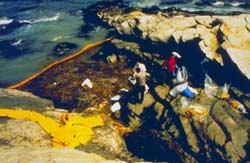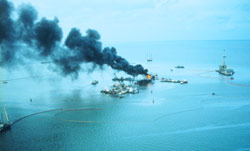Seismic Testing, Oil Spills Impact Environment
Before your current tank of gas was even pumped to shore, the fuel could’ve been having a negative impact on the marine environment. Seismic surveys used in oil and gas exploration utilize air guns to produce explosive impulses of sound directed toward the ocean bottom. Echoes produced by these impulses are recorded and analyzed to provide information on sub-surface geological features for the oil and gas industry.
According to a 2002 article in The Ecologist Magazine, seismic testing performed off Russia’s far east shore to identify oil or gas-rich fields on the ocean floor may have negatively impacted the Grey Whale population in the region. The Grey Whale is one of the world’s most endangered whales, listed as “critically endangered” by the International Whaling Commission.
Other studies of seismic surveys’ impacts on marine animals have noted physical and behavioral changes in fish, squid, turtles, Humpback whales, and dolphins. Many of these animals are considered over-fished, endangered, or threatened, and are managed by state, local, federal, and/or international oversight bodies to assist in their recovery or rebuilding. In many cases, fishing or catching these species for income is severely curtailed or banned, to assist in their recovery.
Most people like some drawn butter with their lobster or clams, but oil is a little much. But oil is what over nine million lobsters were treated to when the barge North Cape ran aground in 1996, carrying home heating oil. Over 800,000 gallons of oil spilled off the coast of Rhode Island, killing millions of lobsters and about one million pounds of clams, oysters, and other crustaceans. Lobstering in the area was closed for five months. According to the National Oceanographic and Atmospheric Association (NOAA), an $8 million settlement was finally reached in 2000, to aid in recovery of the region’s ecosystem, including stocking the area with 1.2 million female lobsters.
The North Cape is just one incident.
The M/V World Prodigy spilled over 250,000 gallons of home heating oil off Newport, Rhode Island on June 23, 1989 – only months after the Exxon Valdez spilled 11 million gallons of oil into the Prince William Sound in Alaska, on March 24, 1989. The Prodigy spill covered approximately 120 square miles during critical spawning periods for many species and, according to NOAA, killed eggs and larvae of fish and shellfish. The incident led to the closure of fishing ground. A $567,000 settlement was reached to restore the natural resources of the area.

When the barge North Cape ran aground in 1996, carrying home heating oil, over 800,000 gallons of oil spilled off the coast of Rhode Island, killing millions of lobsters and about one million pounds of clams, oysters, and other crustaceans. Photo NOAA |
On December 7, 2004 the M/V Selendang Ayu lost power near Unalaska Island, one of the islands making up the Aleutian chain, in the Bering Sea. The vessel, carrying 424,000 gallons of Intermediate Fuel Oil (IFO 380) and 18,000 gallons of marine diesel, went aground on December 8, breaking in two and spilling at least 40,000 gallons of oil. According to NOAA, many species of fish, marine mammals, and seabirds make the waters of Unalaska their home, thus increasing their vulnerability following the spill. Some of these species, such as the Steller sea lion, are federally endangered. Fishing activities in the region have been severely curtailed in recent years to assist in the Steller’s recovery.
On April 27, 2003, Bouchard Barge 120 ruptured its hull, spilling over 90,000 gallons of No. 6 Oil into Buzzards Bay off the coast of Massachusetts. In addition to many endangered or threatened birds, diamond back terrapin, and grey and harbor seals, the U.S. Fish and Wildlife listed the following commercially-valuable species as “resources at risk” due to the spill: American lobster, horseshoe crab, American oyster, hard-shelled clam or quahog, soft-shelled clam, American shad, striped bass, and winter flounder, among other species.
In its most recent figures, the U.S. Fish & Wildlife estimates over 6,000 oil spills reported in the year 2000, in the northeast U.S. alone. Globally, over 14,000 oil spills are reported each year.
Natural Gas, Global Warming, Acid Rain, Mercury — A Recipe For Disaster?
Famous for its low carbon dioxide (CO2) emissions, natural gas has been promoted as the alternative to oil in many uses. Available in liquefied or gaseous forms, natural gas is used as an alternative in heating, cooling, energy generation, gasoline, and various other industrial uses.
But some believe the total ecological costs of natural gas cancel out its relatively low CO2 emissions.
“Fugitive emissions of methane alone, which is more potent than CO2, are higher during extraction and transportation of natural gas. This makes it problematic for coastal communities,” says Jim Vallette of Southwest Harbor, Maine, and research director for Institute for Policy Studies’ Sustainable Energy and Economies Network. “Also, offshore seismic activity associated with the extraction of natural gas has a direct impact on the marine environment.”
Concerned about the impact on their economies, fishing communities have been leading the battles against proposals to build near- or off-shore LNG facilities in over a dozen U.S. coastal communities in Maine, Massachusetts, Alabama, California and other states.
Global warming is the slow, long-term increase in average temperature worldwide. Such changes occur naturally; however, scientists generally agree that human activities have dramatically altered and accelerated these processes. The United Nation’s Intergovernmental Panel on Climate Change attributed most of the warming of the planet over the last 50 years to human activities. Greenhouse gases are implicated in this global warming trend and CO2, a by-product of burning fossil fuel, has been identified as the largest source of greenhouse gases.
Concerns around CO2 emissions were mostly focused on atmospheric emissions until a recent NOAA study showed the oceans have been absorbing up to half of the global CO2 emissions. According to an article in the New Scientists, the July, 2004 report suggests the gas is “acidifying the seas and may harm marine life.” Of particular concern is the impact of CO2 on the ability of shellfish to produce their protective shells. According to the study, when dissolved in seawater, CO2 forms carbonic acid, “which in turn can dissolve the shells and skeletons of marine life.”
Acid rain is created from sulfur dioxide emitted by power plants, factories, and car exhausts. The pollutant rises up into the atmosphere where it undergoes a chemical change, acidifying the rain that falls back down to earth.
The Clean Air Act of 1990 required power plants and factories to cut down sulfur dioxide emissions, and today, the levels of pollutants from power plants and factories have reportedly dropped significantly. However, the rain in Maine has essentially stayed the same — 10 to 100 times more acidic than 30 years ago. Most scientists suggest that now the problem is nitrogen oxides, from car exhaust, that’s keeping the acid rain pounding down on us.
In recent years, health advocates have escalated their warnings about high levels of mercury, a neuro-toxin, in large fish such as tuna and swordfish. A December, 2003 Natural Resources Council of Maine report found coal power plants in Massachusetts are the leading source of mercury in the Northeast region. Maine is also affected by major mercury emissions from plants in upwind states, including Pennsylvania, West Virginia and Ohio.
Although coal is mined on land, the effects are felt at sea and in fishing communities. The economic impact of the boycotts of large fish, particularly to the small-scale fishermen, is unquantifiable. Yet the coal-burning power plants, recognized as the leading source of mercury belched into the atmosphere, bear little cost of this economic hardship on fishing communities.
Data collected back in 2001 confirmed that coal-fired power plants are still the primary industrial source of mercury air emissions in the United States. Fossil fuels — like coal and oil — contain mercury, which becomes airborne when burned. Mercury accumulates and builds up in fish and wildlife.

Research director Jim Vallette of Southwest Harbor, Maine predicts that new activities involving oil and gas exploration will continue to be focused further off shore. The above oil rig fire was in the Gulf of Mexico in 1996. Photo NOAA |
Stormy Weather
The Earth atmosphere’s chemical composition has been altered through the buildup of greenhouse gases such as carbon dioxide and methane. These gases have heat-trapping properties and are implicated in the gradual increase in the Earth’s surface temperature over the past few decades. Such changes in the temperature may be causing the increased frequency of weather-related disasters on the planet over the same period of time.
According to Disaster Relief, global warming may cause “increased swings in weather severity,” leading to “warmer oceans which breed more and stronger hurricanes and typhoons.”
According to NOAA’s National Climatic Data Center, between 1980 – 2004, the U.S. was hit by 62 weather-related disasters, each with a price tag of $1 billion or more. The events since 1988 have added up to $260 billion in damages — with $123 billion attributed to just 14 hurricanes. Many of these incidents involved coastal communities, yet it’s unclear whether loss of income to fishing communities is calculated in these totals, although, in some instances, losses to ranching and farming have been identified.
As the ocean temperatures change, regional ecosystem make-up can also be affected.
One study conducted by scientists at the University of California, Davis, suggests global warming “may facilitate a shift to dominance by non-native species, accelerating the homogenization of the global biota.” In other words, as the climate becomes more inhospitable for native species — some of them commercially valuable — in a particular region, they are often displaced by non-native species. Non-native species are mostly introduced to new regions through global ship traffic, but typically don’t survive unless presented with the right conditions.
Other studies warn of similar possibilities on land as well as at sea.
Rising sea levels is another recognized by-product of global warming. Of particular concern are small islands and coastal regions. Disaster Relief predicts “rising water could potentially lead to backed-up river systems in developing countries where rivers are used to dispose of waste. Ground water on small islands could become contaminated with salt water.”
Pushing Oil & Gas Offshore
According to Vallette, despite calls for transitioning to renewable energy sources, the U.S. Energy Information Administration projects that U.S. consumption of oil, gas, and coal will increase over the next twenty years.
To accommodate this growth, Vallette, who spends his time researching the ecological and economic impact of global oil and gas exploration, says the U.S. will probably increase its import of overseas oil from 55 percent today to 70 percent, with coal mining remaining a domestic industry.
He also believes availability of gas will be driven by the various LNG projects proposed in dozens of coastal and fishing communities in the U.S.
Vallette also predicts that new activities involving oil and gas exploration will continue to be focused further off shore. Current efforts are already underway in Nigeria, Brazil, Nova Scotia, Gulf of Mexico, Indonesia, West Africa, the Caspian Sea, and, of course, in New England, where proposals for near and offshore LNG facilities are under consideration.
“The total cost to the marine environment and the fishing communities is enormous. Impacts from seismic testing, pollution from drilling muds, oil spills, and fugitive emissions, to name a few, could be undermining efforts underway to protect marine ecosystem,” says Vallette. “Fish, whales and other animals migrate throughout the ocean and this trend to move oil and gas terminals out of sight and off shore should be a concern to fishing communities everywhere.”
|





